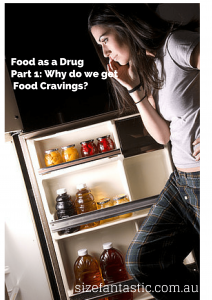Part 1: Why do we get food cravings?
Here’s the scenario: It’s 9pm and you’re sitting on the couch watching your favourite TV show. You’ve had dinner but you can hear the chocolate bar in the fridge calling you. It’s been calling you all day. As the calling of the chocolate bar gets louder, you know that you have to have it. You walk to the fridge, take it out and practically wolf it down before you even get back to the couch. How do you feel now? Satisfied? Guilty? Left wanting more?
We all get cravings at some point. Chocolate, cake, whatever takes our fancy. It’s important to understand why we get these cravings and why we might be feeling deprived even if we’re not actually hungry.
Let’s start with the basics. A food craving is when our body has a strong urge to feed on a particular item. More often than not, these foods that we crave are the ones we usually restrict – calorie-dense, high-fat, or sugary foods. The interesting fact about these cravings is that they come from the brain, not the stomach.
If you find yourself getting strong food cravings often, do you also frequently feel…
o Stressed?
o Down, sad or depressed?
o Tired and lacking energy?
These three factors are the most powerful influences when it comes to food cravings. High-energy foods give us a quick hit of energy, they make our taste buds happy and they make us happy. As humans, we live to experience pleasure. When something goes bad in one part of our life we can turn to food to give us the pleasure we are looking for.
So what actually goes on in our body to make us crave certain foods?
Our brain has two important neurotransmitters involved in the process of food cravings, Serotonin and Dopamine. A diet high in caffeine, a diet low in protein and chronic stress can cause our Serotonin levels to decrease. When these levels get very low, our brain signals us to find foods that can raise our Serotonin levels. These foods are usually the ones highest in calories and sugar.
As we eat these foods, insulin gets released, lowering our blood sugar and leaving behind Tryptophan, a precursor for Serotonin. Unfortunately, studies have shown that Serotonin can also inhibit Dopamine in the brain. This makes us want more sugary foods, thus increasing our cravings (Blum, 2006).
Therefore, it is important to make sure that we are fueling our bodies with the right foods – lots of fresh fruit and vegetables, protein and grains. When we feed our body nutritious foods, our body will reward us by giving us less cravings, and when we do crave it will most likely be the foods we are already eating!
…Stay tuned for part 2 of this series which will talk about food addictions.
*Blum, Kenneth (2006). Reward deficiency syndrome in obesity: a preliminary cross-sectional trial with a genotrim variant. Advances in Therapy.
Spread the Word to get this healthy message out! Like or share this page with your friends on your fave social media platform!



